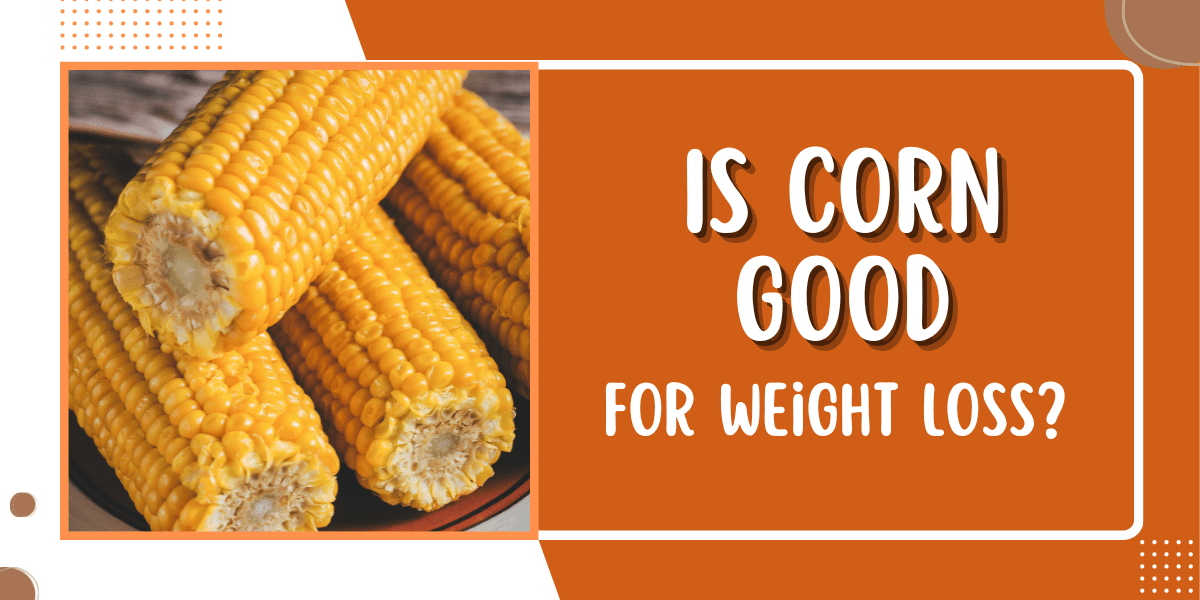
When it comes to weight loss, there are a lot of myths and old wives’ tales out there. Some people swear by cutting out carbs, while others say you need to eat more to lose fat. So, what’s the truth? Can corn help you lose weight?
The simple answer is YES—corn can help you lose weight.
Nutrient Content of Sweet Corn
Corn is packed with fiber. Dietary fiber helps you feel fuller for longer, so you’re less likely to snack between meals or overeat at mealtimes. Fiber also helps regulate your digestive system, promoting regularity and helping to prevent constipation. All of this adds to a trimmer waistline and fewer pounds on the scale.
Corn is also a low-calorie food. A cup of cooked corn kernels has just 130 calories, making it a great addition to any weight loss diet. And since it’s so filling, you’ll be satisfied with smaller portions. Plus, its high water content means that it will help keep you hydrated—and we all know that proper hydration is key to success when trying to lose weight.
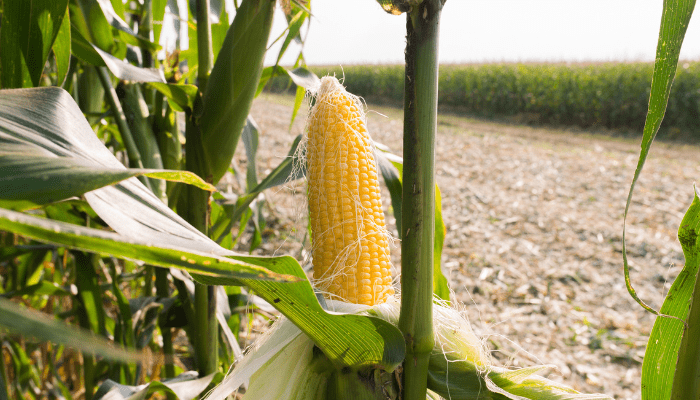
Nutrient Amount
Energy 86 kcal
Water 76 g
Protein 3.27 g
Fat 1.35 g
Carbohydrate 18.7 g
Sugars 6.26 g
Starch 5.7 g
Fiber 2 g
Potassium 270 mg
Benefits of Sweet Corn for Weight Loss
Sweet corn is low in calories and high in fiber.
A cup of cooked sweet corn provides just 97 calories and 4 grams of fiber. That means it’s a filling, low-calorie food that can help you reach your weight loss goals. Fiber is important for weight loss because it helps promote feelings of fullness, which can help you eat less overall. For example, in one study, participants who increased their fiber intake by 14 grams per day (the equivalent of one cup of sweet corn) consumed 10% fewer calories per day (1).
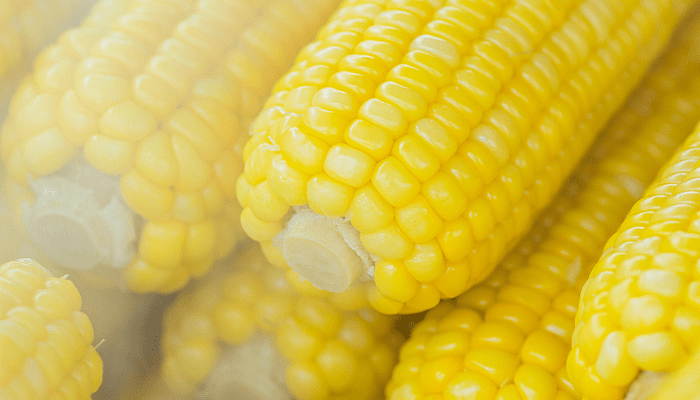
Sweet corn is a good source of protein.
Not only is sweet corn low in calories, but it’s also a good source of protein. A cup of cooked sweet corn provides 5 grams of protein, about 10% of the daily recommended value. Protein is important for weight loss because it helps promote satiety and preserve muscle mass during weight loss (2,3). Getting enough protein can also help prevent age-related muscle loss, leading to weight gain (4).

Sweetcorn is rich in antioxidants.
Sweetcorn is also rich in antioxidants, nutrients that scavenge harmful toxins from the body and protect cells from damage. These effects may help reduce the risk of some chronic diseases, such as heart disease and cancer (5). What’s more, one type of antioxidant found in sweetcorn — lutein — has been linked to improved brain function and lower rates of cognitive decline (6). Adding sweetcorn to your diet may help support a healthy weight and brain function as you age.
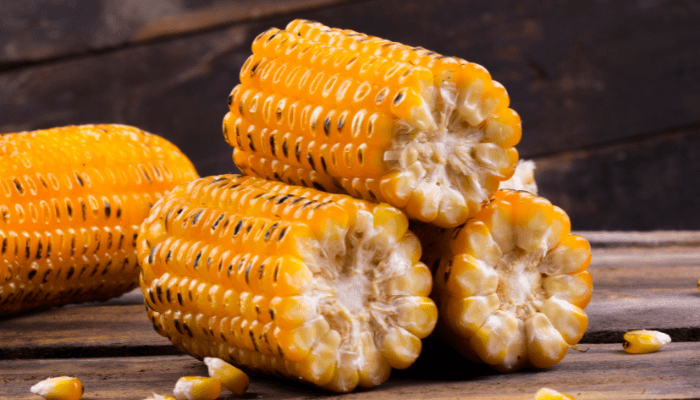
For Weight Loss, How Much Corn Should You Consume Each Day?
The amount of corn you consume daily for weight loss depends on your individual caloric needs. For example, if you need 2,000 calories per day to lose weight, you must consume about half a cup of corn. This may seem like a small amount, but remember that corn is a high-calorie food. So, half a cup of corn is quite a lot in terms of calories.
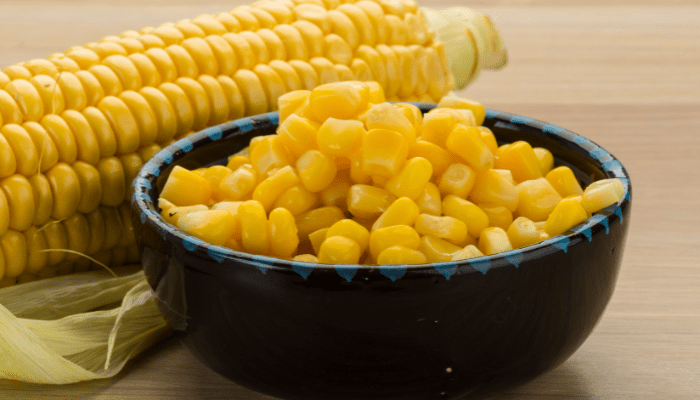
When Should You Eat Corn for Weight Loss?
At breakfast
Adding corn to your breakfast can start burning calories faster and stay full longer. It also curbs the appetite so that lunchtime doesn’t feel too soon!
Before meals
Corn is a great way to get your appetite and avoid overeating during meals.
As a snack
The health benefits of corn are undeniable. It’s a great snack option to help satisfy your hunger pangs and keep you feeling fuller for longer while providing essential nutrients that the body needs!
Pre or post-workout
The perfect post-workout snack is an excellent source of carbohydrates that can fuel your body before and after a workout. It provides essential energy during exercise and afterward, helping to prevent muscle breakdown by providing quick access to Stores where proteins are stored, so they don’t get digested or used first!

How Can I Eat Sweet Corn to Lose Weight?
1. Eat it raw: Raw sweetcorn is low in calories and high in fiber, making it the perfect snack for those watching their weight. Wash the cob, then slice off the kernels and enjoy!
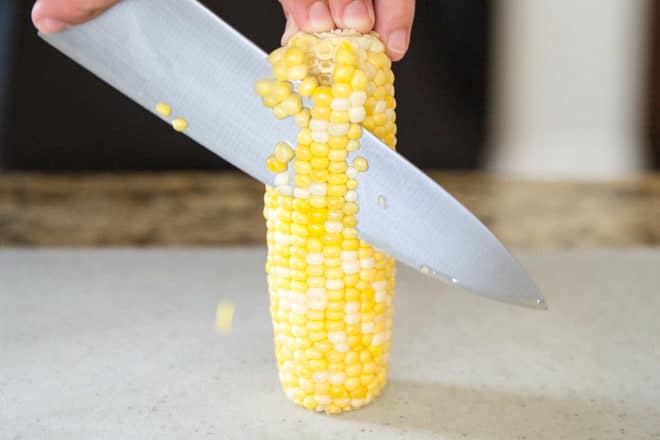
2. Add it to salads: One of the best ways to enjoy sweetcorn is in a salad. Pair it with some leafy greens, diced tomatoes, and a light dressing for a healthy and filling meal.
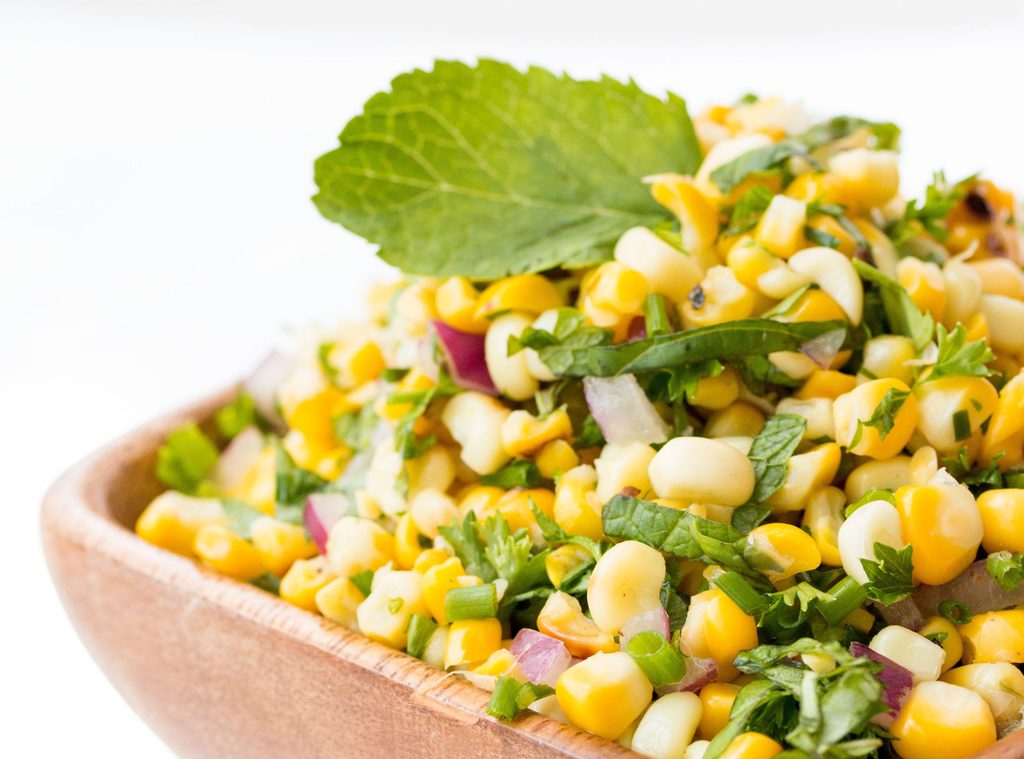
3. Soup it up: Soups are another great way to incorporate sweetcorn into your diet. Add a few kernels to your favorite recipe – or try this delicious sweetcorn and bacon soup from BBC Good Food!
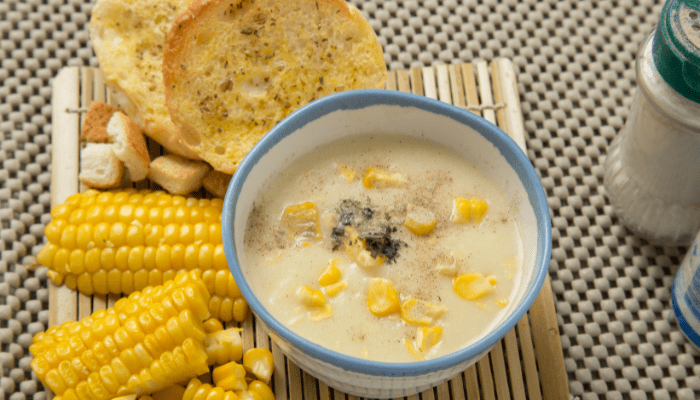
4. Grill it: Grilled sweetcorn is a summertime staple. Season the kernels with olive oil, salt, and pepper, then pop them on the grill for a few minutes until cooked. Delicious!
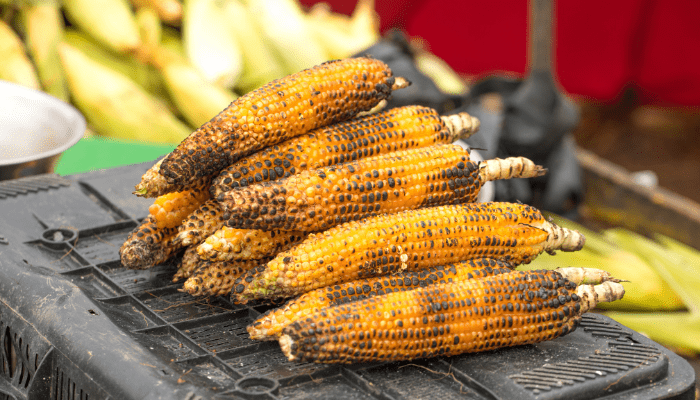
5. Enjoy it as popcorn: Popcorn is a popular weight loss snack – but did you know that you can make your own at home using sweetcorn kernels? Place them in a pan with oil, then put them in the oven until they start popping!

Risks of Overeating Corn for Weight Loss
While corn is a healthy food packed with nutrients like fiber, vitamins, and minerals, overeating can lead to weight gain. That’s because corn is also a high-carbohydrate food, and consuming too many carbs can lead to increased fat storage—especially around the midsection.
In addition, corn is also a high-glycemic food, which means it can cause spikes in blood sugar levels. And when blood sugar levels spike, so do insulin levels—and insulin promotes fat storage. So, cutting back on corn may be necessary if you’re trying to lose weight.
But that doesn’t mean you have to cut it out completely. A moderate amount of corn as part of a healthy, balanced diet shouldn’t derail your weight loss efforts, and it may even help by providing your body with the fiber and nutrients it needs to function correctly. Just be sure to watch your portion sizes and pair corn with other low-carb foods to help balance out its impact on your blood sugar levels.
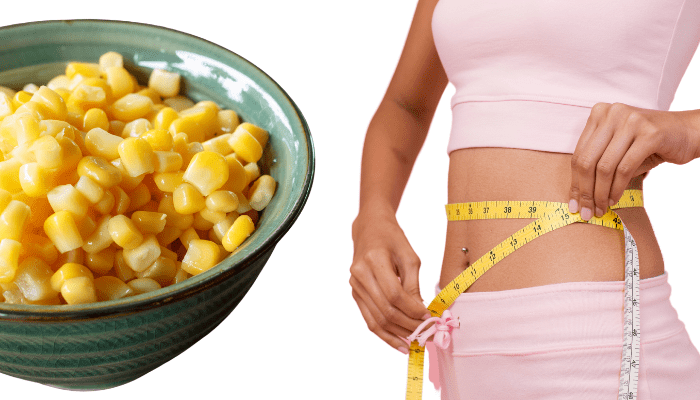
What Other Health Advantages Does Corn Have?
Corn may help to protect against cancer.
Some studies have shown that corn compounds may help protect against certain types of cancer, including ovarian and breast cancer. In addition, corn antioxidants may help scavenge harmful free radicals that can damage cells and lead to cancer development. More research is needed in this area, but adding corn to your diet may help to reduce your risk of developing cancer.
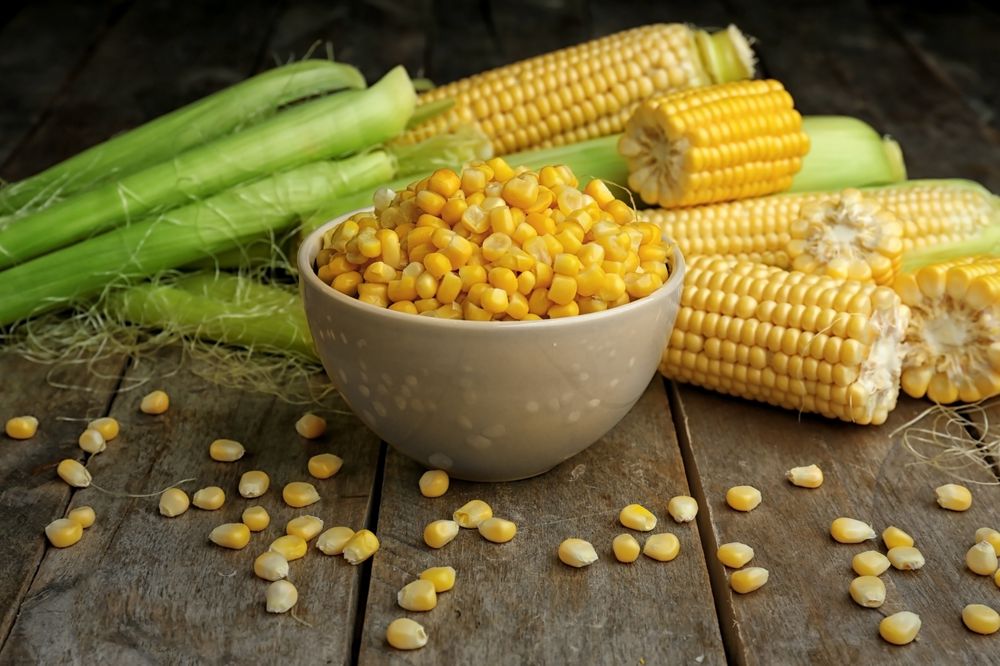
Corn may help to improve cognitive function.
Some studies have shown that consuming foods rich in carotenoids, like corn, may help to improve cognitive function and reduce the risk of cognitive decline in older adults. The carotenoids in corn can cross the blood-brain barrier and accumulate in the brain, which may help protect cells from damage caused by free radicals. So eat some corn today to help boost your brain power!

Corn may help to relieve constipation.
Corn’s high fiber content can help add bulk to stool and relieve constipation. If you are struggling with constipation, try adding corn to your diet or taking a fiber supplement from corn bran. Consult your doctor before making any dietary changes if you have a medical condition like IBS or Crohn’s disease.

Final Thoughts
So there you have it—corn can help you lose weight! Just be sure to watch your portion sizes and pair corn with other low-carb foods to help balance out its impact on your blood sugar levels. And don’t forget to enjoy all the other health benefits corn offers!
Frequently Asked Questions
Can I eat corn at night for weight loss?
Consuming corn before going to bed has been linked by some people to indigestion, restless nights, and weight gain. This discovery may be because maize has more insoluble fiber and a higher concentration of carbs and starch than other vegetables. However, the impact will probably vary from person to person.
Can I eat boiled corn for weight loss?
Yes, cooked corn with little to no butter or oil added to it makes a healthy substitute for high-calorie snacks and processed foods—consuming cooked corn before a meal can also help you lose weight by decreasing your appetite.
Is corn high in sugar?
Vitamins A, E, C, and K are all in corn but absent from rice. Except for vitamin B9, corn is also higher in most B vitamins, including B2 (riboflavin), B3 (niacin), and B5 (pantothenic acid) (folate). Compared to corn, rice has more vitamin B9 in it.
Is corn better than rice?
Rice completely lacks the vitamins A, E, C, and K, while corn includes all four. Except for vitamin B9, corn is also higher in the majority of B vitamins, including vitamin B2 (riboflavin), B3 (niacin), and B5 (pantothenic acid) (folate). In comparison to corn, rice has higher vitamin B9.




